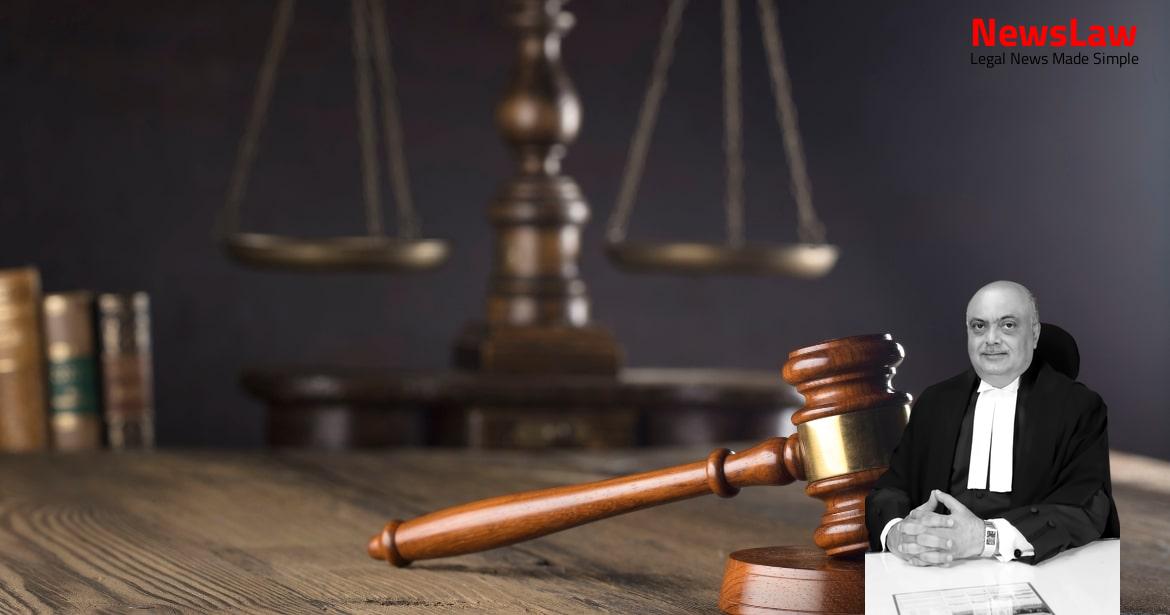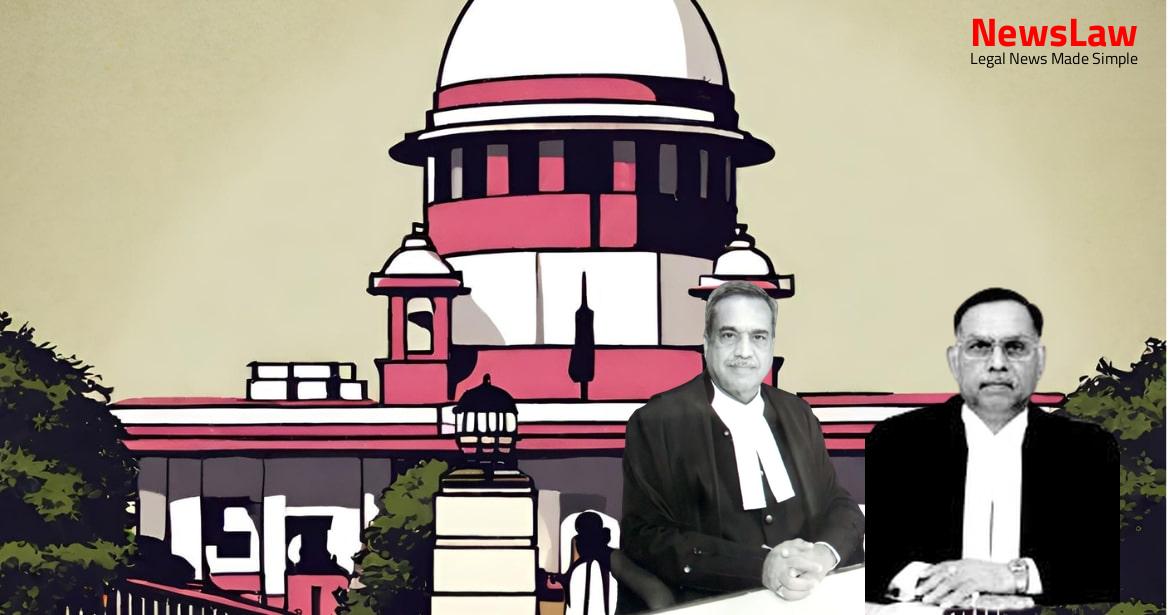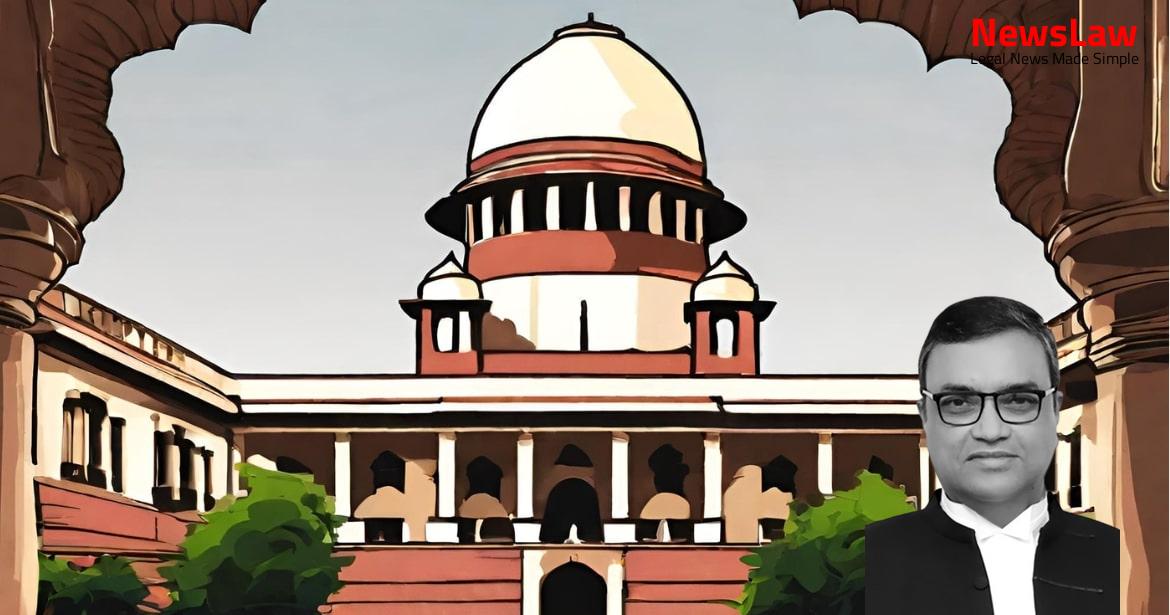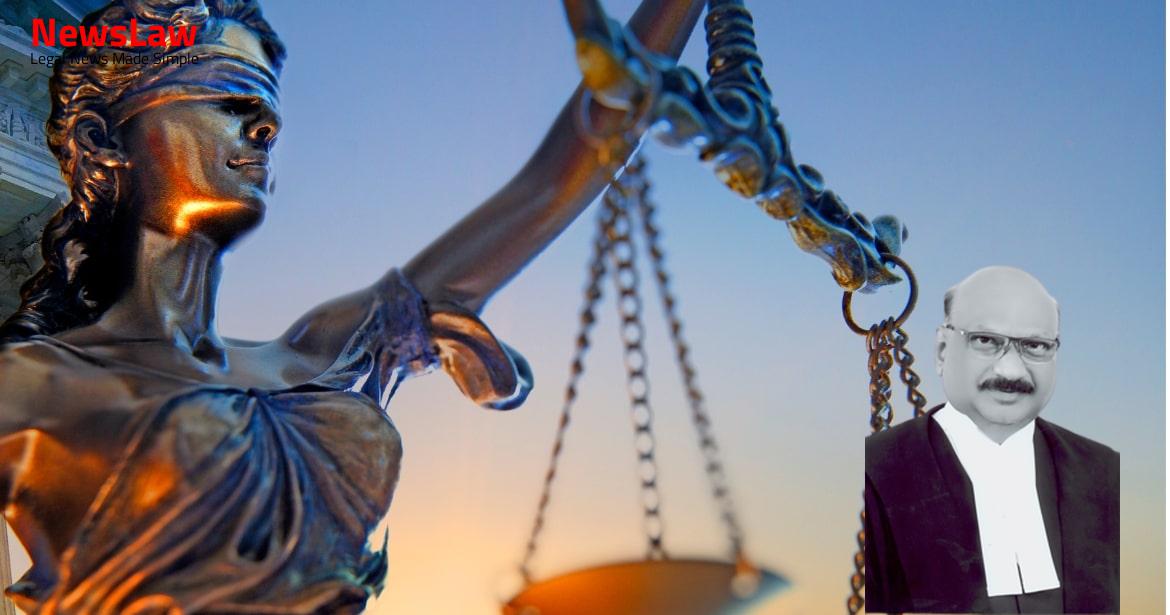Ramesh Chandra Sharma & Ors. 8820 OF 2022 (arising out of S.L.P (C) No 21323/2018) Anoop Singh (Dead) Thr. along with other connected petitions were filed by certain landholders whose land was acquired by NOIDA challenging the decision of the Board of Directors of NOIDA dated 07.01.1998 as also the approval granted to the said resolution by the State Government dated 02.03.2009 whereby a distinction was carved out in the matter of payment of compensation by creating a classification between “Pushtaini” and “Gair-pushtaini” landholders. Madhuri Srivastava reported in (2016) 6 ADJ 1 is in conflict to the law laid down by the Supreme Court in the case of Nagpur Improvement Trust and Another Vs. Vide impugned judgment and order dated 30.03.2018, the Full Bench answered question No 1 in negative and question No 2 in affirmative and upheld the view taken by the Division Bench in the case of Smt. The word ‘Pushtaini’ is a Persian word and finds its origin from the word ‘Pusht’, which means ‘back’. This influx of capital into the city also brought with it massive employment opportunities, and people from all over the country started migrating to Delhi.
Also Read: https://newslaw.in/case-type/criminal/procedural-rigidity-and-quashing-of-detention-order/
Noida started acquisition of land within its territorial area of operation under the provisions of Land Acquisition Act (hereinafter referred to as ‘ 1894 Act ’). In the same connection, notifications dated 03.10.2005 and 05.01.2006 were issued under 5 Sections 4(1) and Section 6(1) of 1894 Act for acquisition of total area of 580.1734 hectares of the land for plan development situate in different villages falling within the jurisdiction of G. The High Court concluded that the urgency clause was wrongly invoked, but saved the acquisition for the reason that much development had already taken place over the said land and the nature of land stands completely changed. It is also pertinent to mention at this stage that even before the land acquisition proceedings were initiated and notification under Sections 4 and 6 of the 1894 Act, were issued, the Respondent-Greater Noida in its 26 Board meeting dated 28.10.1997 decided to classify the landholders for the purposes of payment of compensation for acquisition of their land as ‘Pushtaini’, namely, those landholders who had purchased the land prior to the date of establishment of authority i.e., 28.01.1991 or thereafter got the land by partition or family settlement and ‘Gair-Pushtaini’ being those persons who purchased the land after its establishment.
yard and the ‘Gair-Pushtaini’ landholders including the appellants herein were paid a lesser amount of compensation @ Rs.280 per sq. (1) Lucknow dated 4.09.2008 of the Government of Uttar Pradesh Following Committee has been constituted in connection with making consideration on these types of demands and bonus / ex-gratia /compensation enhancement at the enhanced rate in connection with the land of Village Ghodi Bachheda and other Villages vide Order No.4/4/1/2008 C.X. District Magistrate, Gautam Buddh Nagar – Member Coordinator Examined and perused the records made available in evidence of the Memos submitted by the representatives of agriculture is organizations / Agriculturists 8 and perused the background of the and its different aspects by the Committee and while convening Committee Meeting of the Committee of Villages / their representatives, even consideration was made in respect of the above matter, particulars of which is given below:- 1. Committee has recommended its compensation value @ Rs.800-850 per square metre, in sequence thereto, in the meeting of Greater Noida Authority Board held on 5.01.2008, while assessing the compensation @ Rs.850 per square metre, decision was taken to enforce this rate with effect from 1.04.2007.
The certain Memos of the Villagers were forwarded to the Government for appropriate guidelines/directions while enclosing them as per Authority 9 letter No.931 / land-record / L.P./2008 dated 7.03.2008/ 903/ land-record /LP/2008 dated 10.03.2008, Land Record/1 a/2008 dated 13.03.20081038/land-record/L.A./2008 dated 29.04.2008, 1055/ land-record/ LA / 2008 dated 5.05.2008/ 1069/land-record/ LA/2008 dated 9.05.2008, 1113, 1115/land- record/L A/2008 dated 06.06.08. (1) Lucknow dated 4.09.2008 of the Government of Uttar Pradesh, the above Committee was constituted for giving recommendation in connection with making consideration on the demands of bonus / ex-gratia/enhancement of compensation and etc.
In sequence of above, the meeting of Committee was convened on 22.09.2008 and 11.10.2008 respectively in the Conference Room of the Greater Noida Authority, wherein, while receiving the memo from the Agriculturists of Village and their representatives, the matter was discussed and consulted in detail, wherein, mainly, following people have taken part- 1. Pratap Singh Bhati, 9. Grounds of the demand and memo submitted by the Agriculturist – There records were received in support of detailed Memos and particulars in connection with the demands from the Villages in their meeting by the Committee. The agriculturist of the land acquired in the year of 2006- 2007 of Village Ghodi Bachheda and including other Villages have collectively produced detailed and factual Memos including necessary records before the Committee and even grounds were also raised by the Agriculturists orally in support of their demand, wherein, main grounds are included, which are as under:- 1. The Villagers have produced their demand, while disclosing detailed grounds before the Committee constituted under chairmanship of the learned District Magistrate vide Order dated 10.06.2008 of the Chairman and Chief Executive Officer, Greater Noida but, even then, the Committee, without making intensive consideration thereon, has given recommendation for enhancement @ That the land of the following Villages were acquired for well-planned development of the Greater Noida in the Financial Years 2006-2007 including Village Gonda, Bachada and other Villages and that the possession of the above land was taken after 01.04.2006 and the Agriculturists of the above land are making demand for enhancement of compensation.
Garbara 595830 01.06.2006 4. The copy of consent letter dated 5.01.2007 signed by the then Deputy Chief Executive Officer, Greater Noida and consideration and consultation made on the Memos submitted on 5.01.2007 in the matter by the Villagers with Member of Parliament Shri Ashok Pradhan and the then 13 MLA Shri Nawab Singh Nagar was also provided to the agriculturists, wherein, it is mentioned that this decision has been taken in connection with enhancing the compensation of the acquired land that after calling the rates of compensation of the land being acquired by the Ghaziabad Development Authority and the land of Tronica City of Housing Development Board, till the last week of February, decision will be taken in connection with enhancing the compensation.
Such finding has been concluded in its report dated 21.07.2008 that it is not possible to make any change in the rate of compensation in accordance with law, because of receiving the compensation after fulfillment of the agreement under the Agreement Regulation after acquisition of the land by the concerned Agriculturists, but, the Committee has recommended in its report dated 21.07.2008 to award certain amount in the detailed circumstances on account of ex-gratia. Therefore, in view of the above detailed factual analysis, consultation, discussion, consideration made from the Agriculturists and assurance given at the level of Authority, this Committee is hereby made recommendation to make payment of the amount @ Rs.310 per square metre on account of Ex gratia to the ancestral Agriculturists of the questioned land of 8 Villages detailed in Para No.4 possession of which has been received in the financial year 2006-2007 and the Committee is hereby further recommended to submit the recommendation before the Greater Noida Authority Board for necessary proceedings. No.1 – For approval of minutes of 74th Board Meeting of the authority 74th Board meeting of Authority was held on 03.11.2008.
Name of Village acquired area date of transferring (in heatare) possession of the land to the Authority 1. In the 72nd meeting of the Board held on 11.08.2008, while using the Recommendation of the Committee, this direction was given that, while making calculation of the situation of the financial sources and its management, the matter may be referred to the Government, as per Government Order No.4/4/1/2008 – C.X. District Magistrate, Gautam Buddha Nagar -Member Coordinator The committee has submitted its recommendation on 25.10.2008, wherein, the recommendation has been made to make payment on account of ex-gratia @ Rs.310 square metre to the ancestral agricultural of the land whose possession has been received in the Financial Year 2006-2007 of 1.04.2006 by the Greater Noida in respect of the land of Village Ghodi Bachheda and recommendation has been made to submit the matter with recommendation of the Committee before the Greater Noida Authority Board for necessary proceedings.
And as per letter No.527/8 -VK BHL a dated 23.06.2008 received from the land acquisition officer, the amount of Rs.5,27,56,68,568 (Five Arab Twenty seven crores, fifty six lakhs sixty eight thousand five hundred sixty 17 eight only), which is 95.54%, has already been distributed among the concerned Agriculturists. For the sake of convenience, the break-up of compensation granted to both the categories of landowners is being produced hereunder :- Dates Rate Of Compensation for Pushtaini Landowners Rate Of Compensation for Gair-pushtaini Landowners Difference in Compensation 28.10.1997 (GNOIDA) making 2 categories for compensation & July-Sept. No ex-gratia payment for Gair- pushtaini land owners Rs. 10.2011 (GAJRAJ High Court Judgment ) & 02.11.2011 (G NOIDA treated ex gratia payment made to the Pushtaini Land Owners as Additional Compensation, Rs.
Also Read: https://newslaw.in/case-type/civil/land-resumption-and-annulment-setting-aside-impugned-orders/
It has also been contended that the ex-gratia payment as a form of compensation does not exist in the Land Acquisition Act, and can only be interpreted as one of the reasons for payment within Section 23 of the Land Acquisition Act, and in such a scenario, the payment must be universally made to all parties. The Appellants had entered into an agreement as per the law of the land and had accepted the compensation granted to them. As regards to the ex-gratia payment given to the Pushtaini landowners, the same is merely an additional compensation based on the classification between sons of the soils and mere investors in the land. Ravindra Kumar, learned Senior Counsel appearing for the Greater Noida and Shri Ravindra Kumar Raizada, learned counsel for the State of U.P./A.A.G., at great length. It has been vehemently submitted on behalf of Greater Noida that the appellants herein did not exhaust their remedy under Section 18 of the Land Acquisition Act and approach the High Court, and has sidestepped a procedural requirement. The first and foremost thing to be taken note of is that the nature of the challenge in the Writ Petition filed by the appellants before the High Court was based on violation of Article 14, which is a fundamental right enshrined in the Constitution. Similar agreements were also entered into with the Authority by such identically situated landholders who have been granted additional compensation subsequent to the agreement by carving out a distinction on the basis of period of residence/occupation of the land which was acquired by creating an artificial classification of ‘Pushtaini’ and ‘Gair-Pushtaini’ landholders. This Court is reminded of the words of Francis Bacon, who in the 17 century wrote about the link between legal certainty and justice: “For if the trumpet give an uncertain sound, who shall prepare himself to the battle?
Whether the classification made by and executive fiat between Pushtaini Landowners and Gair-pushtaini Landowners for payment of compensation at different rates is liable to be struck down as violative of Article 14 of the Constitution? Subject “acquisition and requisition of property for the purposes of 27 the Union” was mentioned as Entry No 33 of List-I and “acquisition and requisition of property except for the purposes of the Union” was mentioned as Entry No 36 of List-II of the Seventh Schedule of Constitution. Having considered all aspects of the matter by keeping in mind the Constitutional provisions discussed above and also the intent of the Act, 1894 especially the provisions of Sections 23 and 24 of the Act, 1894, we are of considered opinion that the classification introduced among the Pushtaini and Gair-pushtaini farmers is reasonable with intelligible differentia and that in no manner causes any discrimination among the similarly situated person. For any classification to survive the test of Article 14, the classification must be based on intelligible differentia, and it must have a rational nexus to the object sought to be achieved by the law.
The Court, while dismissing the appeal of the state held that:- 7 (1952) AIR 75 29 “ It can be taken to be well settled that the principle underlying the guarantee in Article 14 is not that the same rules of law should be applicable to all persons within the Indian territory or that the same remedies should be made available to them irrespective of differences of circumstances [Charanjit Lal Chowdhury v. As there is no infringement of the equal protection rule, if the law deals alike with all of a certain class, the legislature has the undoubted right of classifying persons and placing those whose conditions are substantially similar under the same rule of law, while applying different rules to persons differently situated. 540 (1942) : 1942 SCC OnLine US SC 125], but the classification should never be arbitrary, artificial or evasive. But if it is established that the person complaining has been discriminated against as a result of legislation and denied equal privileges with others occupying the same position, I do not think that it is incumbent upon him, before he can claim relief on the basis of his fundamental rights, to assert and prove that in making the law, the legislature was actuated by a hostile or inimical intention against a particular person or class. Wakefield, 62 L Ed 1154 : 247 US 350 (1918) : 1918 SCC OnLine US SC 148] ; but no question of intention can arise when discrimination follows or arises on the express terms of the law itself.” 31 35.
The Court found the said Act in clear violation of Article 14 since only 14 banks were restrained from conducting banking business in the future while other banks including foreign banks were allowed to continue Banking in India. Secretary, Ministry of Law and Justice, while considering the question of scrapping Section 377, IPC as violative of Article 14 has detailed out the test of reasonable classification under Article 14 as under :- “We, first, must test the validity of Section 377 IPC on the anvil of Article 14 of the Constitution. The legislature is fully empowered to enact laws applicable to a particular class, as in the case at hand in which Section 377 applies to citizens who indulge in carnal intercourse, yet the classification, including the one made under Section 377 IPC, has to satisfy the twin conditions to the effect that the classification must be founded on an intelligible differentia and the said differentia must have a rational nexus with the object sought to be achieved by the provision, that is, Section 377 IPC.
Further, the object of this classification, as stated by the full bench of the High Court, is to rehabilitate the original residents, i.e the sons of the soil, who are likely to become landless due to the acquisition of their land.
Many Gair-pushtaini landholders, whose main area of residence or their main source of income is also the subject land, would be subject to great discrimination and injustice, if the same compensation that has been granted to the pushtaini landholders is not extended to them. While dealing with this, the Court held that interference in administrative decisions was permissible, only if (i) the order was contrary to law (ii) or relevant factors were not considered, or (iii) irrelevant factors were considered or, (iv) or the decision was such that no other authority under similar circumstances would have come to this conclusion. The power of the Court to interfere in each case is not as an appellate authority to override a decision of the local authority, but as a judicial authority which is concerned, and concerned only, to see whether the local authority have 10 [1948] 1 KB 223 36 contravened the law by acting in excess of the powers which Parliament has confided in them.
The relevant extracts from the said judgment is reproduced hereunder:- “Lord Greene said in 1948 in the Wednesbury case [(1948) 1 KB 223 : (1947) 2 All ER 680 (CA)] that when a statute gave discretion to an administrator to take a decision, the scope of judicial review would remain limited. Further, GNOIDA, by arbitrarily classifying the landowners as Pushtaini and Gair-pushtaini on the basis of a cut-off date, have taken into account an irrelevant factor. This was the first formal introduction of the Proportionality test to Indian Jurisprudence, however the Court pointed out that the proportionality test has been used by the Indian Courts even before this judgment. Under the principle, the Court will see that the legislature and the administrative authority “maintain a proper balance between the adverse effects which the legislation or the administrative order may have on the rights, liberties or interests of persons keeping in mind the purpose which they were intended to serve”. The above principle of proportionality has been applied by the European Court to protect the rights guaranteed under the European Convention for the Protection of Human Rights and Fundamental Freedoms, 1950 and in particular, 39 for considering whether restrictions imposed were restrictions which were “necessary” — within Articles 8 to 11 of the said Convention [corresponding to our Article 19(1)] and to find out whether the restrictions imposed on fundamental freedoms were more excessive than required.
On account of a Chapter on Fundamental Rights in Part III of our Constitution right from 1950, Indian Courts did not suffer from the disability similar to the one experienced by English Courts for declaring as unconstitutional legislation on the principle of proportionality or reading them in a manner consistent with the charter of rights. “Reasonable restrictions” under Articles 19(2) to (6) could be imposed on these freedoms only by legislation and Courts had occasion throughout to consider the proportionality of the restrictions. Row [(1952) 1 SCC 410 : AIR 1952 SC 196 : 1952 SCR 597 : 1952 Cri LJ 966], observed that the Court must keep in mind the “nature of the right alleged to have been infringed, the underlying purpose of the restrictions imposed, the extent and urgency of the evil sought to be remedied thereby, the disproportion of the imposition, the prevailing conditions at the time”.
There are also cases where legislation or rules have been struck down as being arbitrary in the sense of being unreasonable [see Air India v. In Australia and Canada, the principle of proportionality has been applied to test the validity of statutes [see Cunliffe v. Secondly, the means, must not only be rationally connected to the objective in the first sense, but should impair as little as possible the right to freedom in question. Flores
[(1997) 521 US 507] the principle of proportionality has been applied to legislation by stating that “there must be congruence and proportionality between the injury to be prevented or remedied and the means adopted to that end”. Under Article 3(1) of the Human Rights Act, 1998 the English Court can now declare the legislative action as incompatible with the rights and freedoms referred to in the schedule. While 12 (2017) 10 SCC 1 13 (2020) 10 SCC 459 43 summarizing the aforementioned principle into a four-pronged test, the Bench held: “…The action must be sanctioned by law; The proposed action must be necessary in a democratic society for a legitimate aim; The extent of such interference must be proportionate to the need for such interference; There must be procedural guarantees against abuse of such interference.” 44
Case Title: RAMESH CHANDRA SHARMA Vs. THE STATE OF UTTAR PRADESH (2023 INSC 144)
Case Number: C.A. No.-008819-008819 / 2022



